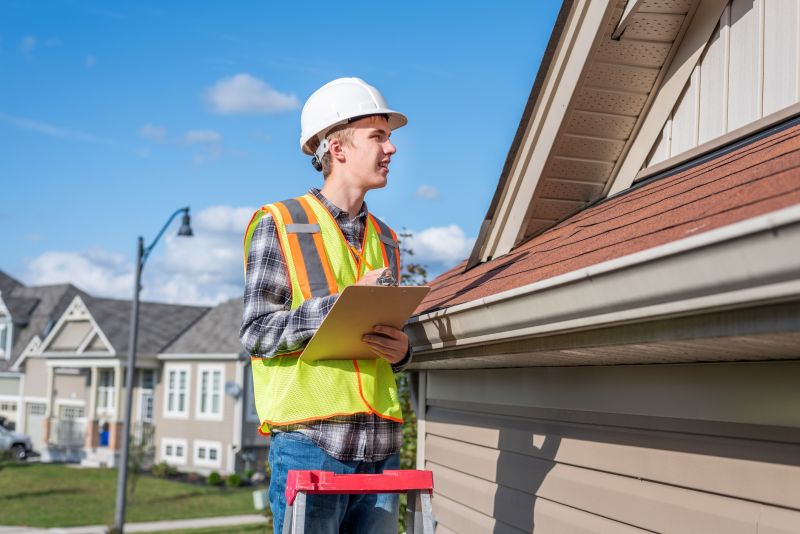Top-Rated Tools For Professional-Grade Roof Inspections
Equip yourself with high-quality products favored by professionals for precise assessments and long-lasting performance.
 Conducting a roof inspection is a crucial task for maintaining the integrity and safety of a building. To perform thorough inspections, a variety of specialized tools and products are available, each designed to assist in identifying potential issues such as leaks, damaged shingles, or structural concerns. Whether you're a homeowner, a professional inspector, or a contractor, selecting the right equipment can significantly improve the accuracy and efficiency of your assessments.
Conducting a roof inspection is a crucial task for maintaining the integrity and safety of a building. To perform thorough inspections, a variety of specialized tools and products are available, each designed to assist in identifying potential issues such as leaks, damaged shingles, or structural concerns. Whether you're a homeowner, a professional inspector, or a contractor, selecting the right equipment can significantly improve the accuracy and efficiency of your assessments.
Top Overall Option
Multi-Function Roof Inspection Kit
A versatile inspection kit that combines a high-quality flashlight, infrared thermometer, moisture meter, and mirror in one package. Designed for both professional and DIY use, it offers a comprehensive set of tools to facilitate detailed roof assessments. Its durable construction and user-friendly interface make it a reliable choice for identifying potential issues efficiently.
Types of Products For Roof Inspections
Handheld Flashlights and Headlamps
Essential for illuminating dark or shaded areas during inspections, especially in tight spaces or under eaves.
Infrared Thermometers
Detects temperature differences that may indicate moisture intrusion or insulation problems.
Moisture Meters
Measures moisture levels within roofing materials to identify potential leaks or water damage.
Binoculars with High Magnification
Allows for detailed visual inspection of roof surfaces from a safe distance.
Roof Inspection Drones
Provides aerial views of large or complex roofs, capturing images and videos for detailed analysis.
Ladder and Safety Gear
Fundamental for safe access to roof surfaces, including harnesses, helmets, and non-slip footwear.
Roofing Inspection Cameras
Specialized cameras designed to capture close-up images of shingles, tiles, or other roofing materials.
Gutter Inspection Tools
Assist in examining gutters and downspouts for blockages or damage that could affect roof health.
Reflective Roof Coatings Test Kits
Help assess the reflectivity and condition of roof coatings to determine if maintenance is needed.
Ultraviolet (UV) Light Inspection Devices
Reveal hidden damages or leaks by highlighting areas with UV-sensitive materials.
Roof Surface Inspection Mirrors
Flexible or telescoping mirrors that enable inspection of hard-to-reach roof areas.
Weatherproof Notepads and Marking Tools
Allow inspectors to document findings directly during the inspection process.
Portable Power Banks
Ensure electronic inspection devices remain charged during extended assessments.
Laser Distance Meters
Facilitate accurate measurement of roof dimensions and distances for planning repairs or replacements.
Roof Surface Condition Testers
Evaluate the integrity of roofing materials through various testing methods.
Inspection Ladders with Safety Rails
Provide stable access to elevated roof areas with added safety features.
Popular Choices
Widely used for detecting temperature anomalies on roofs, aiding in identifying moisture or insulation issues.
Popular for their ability to provide clear, detailed views of roof surfaces from the ground.
Increasingly favored for their ability to capture comprehensive aerial footage of large roofs.
Commonly used to assess the presence of water within roofing materials, helping to pinpoint leaks.
Preferred for hands-free illumination during inspections in low-light conditions.
Popular for close-up visual inspections of shingles, tiles, and other roofing components.
Frequently chosen for maintaining proper drainage and preventing water damage.
Used to evaluate the effectiveness of roof coatings and identify areas needing maintenance.
Valued for their ability to reveal hidden leaks and damages not visible to the naked eye.
Popular for inspecting tight or hard-to-reach roof areas safely.
Commonly used to keep electronic devices charged during lengthy inspections.
Favored for quick, accurate measurements of roof dimensions and features.
Modern roof inspection tools range from simple handheld devices to sophisticated electronic equipment. Handheld mirrors and flashlights allow for close-up examinations of hard-to-reach areas, while infrared thermometers can detect temperature variations that may indicate moisture intrusion or insulation problems. More advanced options include drone technology, which enables aerial views of large or complex roof structures without the need for physical access. Additionally, safety equipment such as harnesses and non-slip footwear are essential for working at heights.
Investing in quality inspection products not only enhances safety but also provides more reliable data. For instance, moisture meters help measure the presence of water within roofing materials, and binoculars with high magnification can facilitate detailed visual inspections from the ground or a safe distance. As technology advances, integrated systems that combine multiple functions are becoming increasingly popular, offering comprehensive insights into roof conditions with minimal effort. Properly equipping yourself with the right tools ensures that inspections are thorough, safe, and effective, ultimately helping to prolong the lifespan of the roof and prevent costly repairs.
Key Buying Considerations
- Compatibility with roof types and materials to ensure accurate assessments.
- Ease of use and ergonomic design for prolonged or frequent inspections.
- Durability and weather resistance of electronic devices for outdoor use.
- Battery life and power options to support extended inspection sessions.
- Image and data quality for clear analysis and documentation.
- Portability and weight, especially for handheld or drone equipment.
- Safety features such as non-slip grips, harness attachment points, and stable ladders.
- Compatibility with other tools or accessories for comprehensive inspections.
- Availability of replacement parts and customer support services.
- Cost and value considering the range of features and durability.
- Compatibility with smartphone or tablet apps for data management.
- Infrared and thermal sensitivity for detecting subtle temperature variations.
- Ability to capture high-resolution images or videos for detailed records.
- Ease of calibration and maintenance of electronic inspection tools.
- Compliance with safety standards and certifications for professional use.
This content contains affiliate links and we may earn a commission at no additional cost to you.
